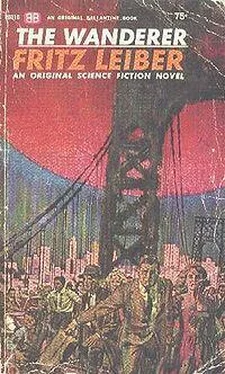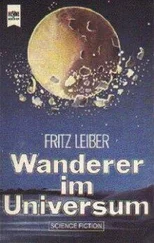Vera turned on her transistor wireless, and they listened all the way around the dial to a sound like bacon frying. Richard wanted to tell her to throw it away, but instead he asked her how her new shoes fitted, and she smiled at him and said: “They’re heavenly.”
Only an hour ago Richard had been tramping lonely in the midst of a mob, and thinking of all the millions or scores of millions of new dead there must be all over the world, and wondering if it really mattered at all.
He had thought, Does the world need so many people? Take the crowd around me now — winnowed by the flood, yet most of them still stupid stereotypes the world could well do without. How many people does it take to sustain a reasonably rich culture? Aren’t more than that a waste? And aren’t millions of stereotypes an overly high price to pay for a few exceptions? Isn’t there something utterly gross about the concept of an endlessly, planlessly multiplied humanity, perhaps eventually swarming like rats to the stars? Did having so many people ever matter, except to the people? The world needs and deserves this winnowing!
But now his thought was that if just one more person had been taken, that person might have been Vera. In theory there were tens of thousands of Veras, he supposed, but only one where this Richard Hillary could have found her. He gripped her arm a little more snugly.
Paul Hagbolt stared down into the bottomless dark as if the circular window on which he rested were the top of a great aquarium, the stars and the tiny semicircles of Earth and Wanderer a mysterious marine luminescence, or as if the round were that of a glass slide under a microscope, and the stars, diamond infusoria.
There was a faint rustling and then a little cry — Miaow crawling weightless through the flowers and calling some discovery to Tigerishka.
From beside Paul, the larger cat said: “Because mankind is young, you think the universe is, too. But it is old, old, old. Tomorrow and tomorrow…petty pace…last syllable of time…tale told by an idiot…yes!
“You think that space is empty, but it’s full. Your own solar system is one of the few primeval spots left, like a small, weed-grown lot overlooked by builders in the heart of a vast and ancient city that has overgrown all the countryside.
“In the galaxy where the Wanderer grew in orbit, the planets are so thick around each sun they shroud its light and make a slum of space, a teeming city of a galaxy. It is the boast of our engineers, ‘Wherever a sunbeam escapes, we place a planet’ Or they moor a field, to turn the sunlight back.
“Tens of thousands of planets around each sun, troubling each other with ten thousand tides, so that tidal harmonizing is half our civil engineering. Planets following each other so closely in the same orbit that they make elliptical necklaces, each pearl a world. You know those filigree nests of balls your Chinese carve of ivory, so that you peer and peer to find the center, and end with the feeling that there’s a little of infinity locked in there? That’s how solar systems look, most places.
“You haven’t yet heard this news, simply because of the snaily slowness with which light travels. If you could wait a billion years, you’d see the galaxies grow dim, not by the death of stars, but by the masking and miserly hoarding of their light by the stars’ owners.
“All but a tiny remainder of the star-shrouding planets are artificial. Billions of trillions of dead suns and cold moons and planetary gas giants have been mined to get the matter to make them — your Egyptian pyramids multiplied by infinity. Throughout the universe, natural planets are as rare as young thoughts.
“Your own galaxy of the Milky Way is no exception. Planet-choked suns chiefly make the great dark central cloud which puzzles your astronomers.
“A pond can fill with infusoria almost as quickly as a ditch-water puddle. A continent can fill with rabbits almost as swiftly as a single field. And intelligent life can spread to the ends of the universe — those ends which are everywhere — as swiftly as it grows to maturity on a single planet.
“The planets of a trillion suns can fill with spaceship-builders as quickly as those of one. Ten million trillion galaxies can become infected with the itch of thought — that great pandemic! — as readily as one.
“Intelligent life spreads faster than the plague. And science grows more uncontrollably than cancer. On every undisturbed natural planet, life crawls and flutters for billions of years, then overnight comes the blossoming, the swift explosion across the great black distances of seeds that grow like weeds wherever they fall, and then the explosion of their seeds on, on, to the incurving ends of the universe.
“There is the drama of meeting other life forms — shocks, moments of poignant wonder. And then, much too soon, comes the ennui.
“The ditch-water puddle, where yesterday a few amoebas swam, is thick with writhing life — and the pond, too. The algae gleam like jewels. Then soon the pool grows clouded.” She pointed a claw toward the thick stars. “Those diamonds you see out there are lies. The suns that sent that bright light now are masked.”
Tigerishka turned her tapering muzzle from the star-spangled window and spoke to Paul directly.
“The universe is full, Paul. Intelligent life is everywhere, its planets darkening the stars, its engineers recklessly spending the power of the suns to make mind’s environment — burning matter to energy everywhere to make more form, more structure, more mind. The Word — to call mind that — goes forth, and soon there is nothing but the Word. The universe with all its great reaches and magnificent privacies becomes a slum, begins to die of too much mind — though they can never see that — just as a shallow sunlit bay can die of too much life.
“Immortality is achieved, breaking down the individual mind’s limits future ward. Your world, Paul, is one of the few islands of death left in the sea of life everlasting.
“With hyperspatial travel and psionic communication, the ends of the universe are closer together than the planets of your solar system. The far-flung galaxies are more centralized than the countries of your world, than even your country’s fifty-one states. And the affairs of the cosmos are ordered by a democratic rulership more benign and more terrible than that of any imagined god.
“It may be that your own primitive visions of heaven — and especially your ambiguous attitude toward it: that heaven is both a great wonder and a great bore — are merely valid intuitions of that government.
“Security and safety are its watchwords. It is conservative, ruled by the old, who are everywhere a great majority since the achievement of immortality. It is painstaking, patient, just, merciful — but only to the weak! — and infinitely stubborn. Its records alone, etched on molecules, occupy the artificial planets of two star clusters. Its chief aim is simply to remember and treasure — but only as a memory! — everything that has ever happened.
“Any minimally intelligent, respectable, safe race of beings can confidently expect from it support for their life-ways. It is always against the expenditure of energy for any purpose except conservation and security: it opposes the exploration of hyperspace, or even its use, except for the transport of its police. Its greatest fear is of something that might seriously injure or altogether disrupt the universe, for now that — bar hyperspace — it is no longer possible to think of safety in infinity and the unexplored, a great cosmic death-dread has arisen.
“Yet since even immortals must reproduce, if only at a minimal rate, to keep up the illusion that they are still truly alive, the government must continually find space for new beings. They’ll be coming for your space soon, Paul. There’s been a change in the policy toward the remaining wild worlds. Heretofore they were looked on as preserves of novelty, to be shielded until they grew to galactic stature. But now their living surface is needed, and their matter, and the energy of their suns. They are to be integrated into the cosmic super-culture. Carefully, thoughtfully, and with kindness — but it will happen to you and probably within the next two hundred of your years. And it will not be a slow process — once it begins, all the wild worlds will be occupied and integrated within decades.
Читать дальше










